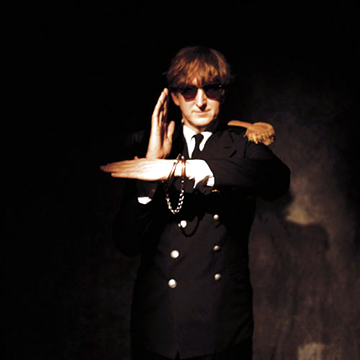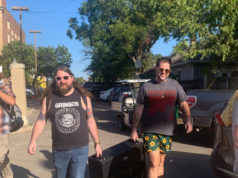 But only now that he’s released his first solo album in 14 years does the Fort Worth-reared singer-songwriter feel 100 percent confident that he’s at the height of his powers. You could say he’s a living testament to his father’s advice from long ago: Put off writing ’til you’re much older.
But only now that he’s released his first solo album in 14 years does the Fort Worth-reared singer-songwriter feel 100 percent confident that he’s at the height of his powers. You could say he’s a living testament to his father’s advice from long ago: Put off writing ’til you’re much older.
“I’ve been working with the most extraordinary group of teachers imaginable,” Burnett said. “All those learning experiences are the most important parts of life.
“I’m not conflicted, and [my songwriting is] not ambiguous,” he continued. “And I feel incredibly fortunate to be able to pick up and go again.”
Like a lot of other records on the shelves, True False Identity deals with the ambiguities of life in a post-9/11 world.
“I didn’t write it with any themes in mind, but I can tell you that we were trying to make music that we couldn’t hear,” he said. “All the music I’ve loved the most was unfathomable to me when I first heard it, and we were trying to give ourselves the freedom to make something that was unfathomable to us — we deconstructed a lot of what rock ’n’ roll was.”
The album’s perspective, while politically ambiguous, takes shots at juicy targets like imperialist government politics and phony humane motives.
What took so long for the record to come to fruition? “A 10-year period of finding my way,” he said. “I learned that the only person who ever stood in my way was myself and that everybody goes through the same — everybody’s got a tough life. Everybody gets humiliated by the business, and nobody ever feels safe.
“Art is about risk,” he continued. “Risk is the thing that separates the artist from the artisan. One of the things I learned was to take risks.”
And he learned it at a young age. Immediately after graduating from Paschal High School in the mid-1960s, Burnett and some friends bypassed college and bought a recording studio in town.
“I never considered doing anything else,” he said. “When I was going to Paschal, there were B-52s in the air constantly, above the school and above the town. Those B-52s would circle the town and fly, then go west and refuel over the Pacific and drop their bombs on Vietnam and fly back to Fort Worth. So those sorts of shenanigans sent me straight into music.”
Burnett’s first solo album, which came out in 1972, was a modest but solid throwback to early rock called The B-52 Band & The Fabulous Skylarks.
By then, he had moved to Los Angeles and begun producing records for fellow Fort Worthian Delbert McClinton. Burnett duly pushed his solo endeavors to the side, where they’ve stayed throughout most of his career. Essential, a career retrospective that’s also being released this month, is still 40 tracks long.
Eventually, the six-string-slinger began playing in Bob Dylan’s Rolling Thunder Revue and producing Elvis Costello, Los Lobos, and Roy Orbison. He’s also helped out newer groups like the Counting Crows, the Wallflowers, and Black Rebel Motorcycle Club, and he twiddled the knobs on two new records, a collection of traditional Delta blues classics reinterpreted by jazz vocalist Cassandra Wilson and the soundtrack to a remake of All the King’s Men.
However, there’s no doubt that Burnett became a pop-cult icon by producing the soundtrack to 2000’s O Brother, Where Art Thou?, a rambunctious compilation of old-timey countrified songs that renewed Burnett’s — and a lot of our — faith in good, popular music.
“We’re living in an age of people who don’t like music, and [True False Identity] is music for people that do like music,” he said. “I think it shows that maybe everybody doesn’t like music — some people find it annoying, some people just don’t care about it — but there is a significant number in the country that just enjoy it.”
Burnett admits he’s out to revitalize what we hear here. He envisions American music “growing up out of the ground and actually tearing down [different] genres,” ultimately creating, perhaps, a true-false identity — true to its roots, false if pigeonholed.











